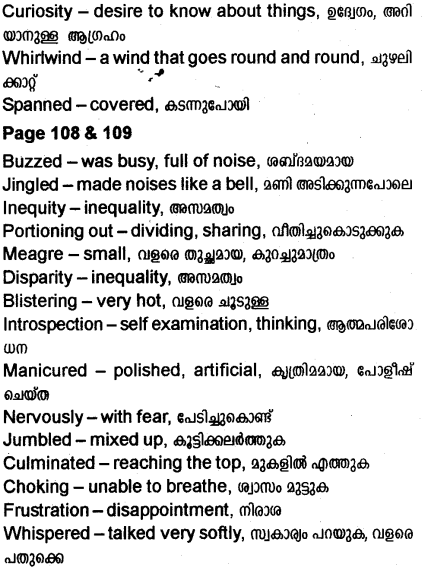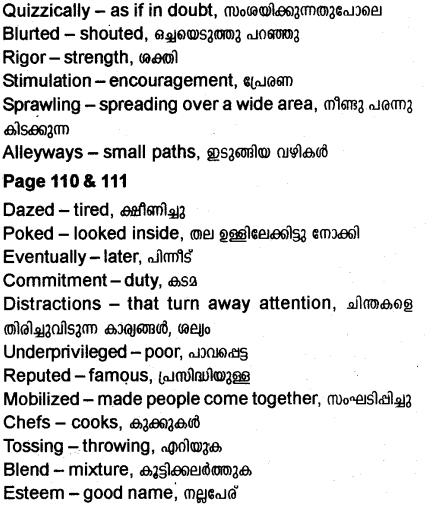Kerala Plus Two English Textbook Didi Questions and Answers Unit 3 Chapter 2 (Story)
Read And Respond
Question 1.
What was Shaheen’s first impression of orphanage?
Answer:
In the orphanage she saw crying children, laughing children, quiet children and screaming children. She was confused. She saw the inequity of life there.
Question 2.
Why does she say that life was not perfect during summer vacation?
Answer:
She says that life was not perfect during summer vacation because her summers were spent between the orphanage in Jakarta and trips back to Mumbai. In Mumbai she saw the extreme poverty and children begging forfood.
Question 3.
What was the ‘search’ Shaheen had in her childhood? How was India answering it?
Answer:
The ‘search’ she had in her childhood was finding ways to help the kids in need. India was answering it because in India she found many children begging on the streets for food. She knew she could help them to live better lives.
Question 4.
What do you understand by the expression ‘manicured reality of my university life”?
Answer:
‘Manicure’ means caring for the fingers and nails. Manicured reality is polished reality. As one who has studied in India, especially in the crowded Mumbai, the authorfelt her university life in the USA was manicured, highly polished.
Question 5.
On what conditions did Shaheen’s parents allow her to stay back in India?
Answer:
They put forward two conditions: she would get admission into a good undergraduate college in the city and later she would go abroad for her graduate degree.
Question 6.
How did Shaheen get her admission to St. Xavier’s even when the admissions were closed.
Answer:
I would say she forced the Principal to admit her. She entered the principal’s room through a side door. Before the surprised Principal, Fr. D’Cruz, could open his mouth she said to him, “Father, my life is in your hands. I want to do something for the children of India. I don’t know how, only that I must.” The Principal asked her a few questions and she was admitted.
Question 7.
What was the condition of Mumbai slums?
Answer:
It was horrible. The slum once Shaheen walked into was a sprawling, low income community which was a maze of small alleyways. It was full of life. Some 10,000 people lived there without running water, no system of waste disposal, and shared six dark cubicle toilets in one alley.
Question 8.
How was Sandhya’s life different from that of Shaheen?
Answer:
Sandhya’s life was utterly different from that of Shaheen. Like Shaheen she was also 18. Sandhya knew no English and Shaheen knew no Hindi. But Sandhya, wearing a sari, smiled, laughed and chatted a lot. Sandhya’s home was smaller than the bathroom of Shaheen’s house.
Question 9.
What is the basic principle ofAkanksha?
Answer:
The basic principle of Akanksha is providing underprivileged children with opportunities for learning. Akanksha wants the classroom to be just a safe place for the children where they can forget, at least for some time, their roubles at home and study and also enjoy. Akanksha came into existence in 1991. It started with 15 children. Now it has 3500 children, with 58 centre and 6 schools. The children are taught, apart from English and Maths, values, self-esteem and confidence.
Question 10.
What did the volunteers teach at Akanksha?
Answer:
At Akanksha the volunteers teach the underprivileged children basic English and Maths, and also values, self¬esteem and confidence.
Question 11.
What kind of difference, do you think, Akanksha must have brought in the slums?
Answer:
Nowthe slum-dwellers knowthe importance of education. They also knowthe importance of hygiene and decent living. They have realized that they too can rise higher in the society with education, determination and hard work. Akanksha has provided people with hopes and dreams.
Think And Write
Question 1.
What kind of problems did Shaheen face when she settled in India?
Answer:
She faced a lot of problems when she settled in India. She wanted to help the underprivileged people of slums, especially children. She wanted to teach them. But finding a place was difficult. She went to 20 schools asking them to give a room just for 3 hours in the morning to teach these poor children. All of them refused. Some thought the idea of teaching underprivileged children was too revolutionary. Some thought the children would spread diseases to other students. A principal of a reputed school even said that the glass bangles worn by the poor children would scratch the fine desks. Finally, when she was about to give up, the Principal of Holy Name High School in Colaba, agreed to give her a room. That was the first Akanksha centre.
Question 2.
What was the iniquity that she found in India?
Answer:
She found a lot of iniquity in India. In a city like Mumbai where some of the world’s richest men live, there are also dirty slums where people live in conditions in which even animals would not live. One of the slums she visited was a sprawling, low income community which was a maze of small alleyways, full of life. Some .10,000 people lived there without running water, no system of waste disposal, and shared six dark cubicle toilets in one alley. She says the house of Sandhya was smaller than her bathroom! This is iniquity indeed.
Question 3.
Why, do you think, the principals of different schools refused to give a space for the children from the slum?
Answer:
Shaheen says that the principals often gave illogical and even silly reasons for not giving a space for the children from the slum. Some thought the idea of teaching underprivileged children was too revolutionary. Some thought the children would spread diseases to other students. A principal of a reputed school even said that the glass bangles worn by the poor children would scratch the fine desks in the classroom!
Question 4.
Shaheen refers to Indian education system as ‘bookish’. Comment on this.
Answer:
Shaheen is very right in saying that the Indian education system is bookish. We lay stress on book¬learning. We give a lot importance to studying things by heart. The examinations also check our memory and not our competence in doing things. Theory is given much more importance than practice. We may know a lot about America and England but may not know the things in our immediate locality.
Activity I (Job application/Resume)
Question 1.
(i) Study the poster.
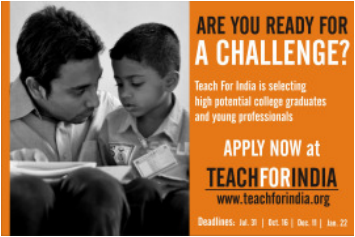
It tells us about another initiative called “Teach for India” by Shaheen Mistri. It is an advertisement seeking volunteers to teach the children in low-income areas.
If you were to apply for this vacancy, what would you write in your application in the resume?
Answer:
(i) Cover Letter
Joe Paul
17, Azad Road
Irinjalakuda North PO
PIN 680 125
15 June 2015
The Chairperson
Teach for India
Kalian Mumbai
Dear Sir,
I have seen your poster asking for people to work in your Enterprise. I would be glad to offer my services as a teacher at the secondary level.
I have a Master’s Degree in English from Ravishanker University, Raipur. I have worked as a teacher in HSS Irinjalakuda for 10 years, teaching English. I would like to utilize my talents forthe betterment of the underprivileged.
I shall be pleased if my application is given due consideration. Although I am willing to come at anytime, anywhere, for an interview I would prefer any day between 20 June and 20 July, preferably in the Thrissur district, of Kerala.
I had been dreaming of helping my countrymen in my own way and I look forward to this opportunity.
Thanking you cordially,
Yours faithfully
(Joe Paul)
(ii) RESUME OF JOE PAUL
Objective : To work in an Organization that works for the welfare of the underivileged
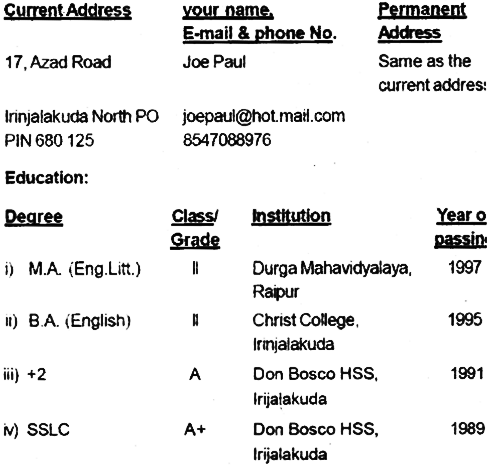
Experience:
- Teacher (HSS lnnjalakuda Teacher -1998-2008)
- Lecturer in English (Students PG Centre lnnjalakuda 2009-1015)
Activities: I am a member of the Rotary Club, irinjalakuda Branch. I have organized blood-donation campaigns.
Achievements: I have published many journal articles on the teaching of English.
Skills: Conversant with computer, Word. I have been the Volley-ball captain while at College. I play the guitar.
Languages: Malayalam, Hindi, English Interests: Reading, travel, Western music Joe Paul
Activity II (Job Interview:)
Question 2.
Suppose your application Is considered positively and you are invited for an interview. What kind of responses would you make for the following interview questions. Use formal and language and be honest In your answers.
Answer:
Interviewer : Why do you prefer to teach?
You : I preférto teach because I believe it is the noblest profession. You mould minds.
Interviewer : Do you have any teaching experience?
You : Yes, I have. I have been teaching since 1997, when I completed my M.A. in English Literature.
I: What do you think is the most serious problem with the education in rural areas?
Y: The rural people, generally, have not understood the importance of education. When a boy or girl is big enough the parents expect the child to help them in the farm or in the household work. Many of them think sending children to school is a waste, especially sending girls to school.
I: If you were to change something about the current education system, what would that be?
Y: I would like to make learning less bookish. We emphasize on learning things by heart. Often in our examination we test memory. This should change. Education should be more practical.
I: How do you plan to create an impact in the society?
Y: I will do my best to teach the underprivileged so that they too can have opportunities like those bom with a silver spoon in their mouth. I will encourage the villagers to send their children to school without making them stay at home to help with the farming and other rural activities.
Activity III: (Modal Auxiliaries)
Read the notes on p. 114 and study the various verbs given in the table there, with their meanings. Read the examples and team howto use them.
LET’S PRACTICE
Question 2.
Given below is the vision of “Teach for India” as given in their website. Go through it and fill in the blanks in the passage with appropriate modal auxiliaries.
Answer:
At Teach For India, each one of us feels lucky. We understand that it is just a matter of chance that we are where we are today. We didn’t choose the family that we were bom into, or choose the fact that our parents could afford.to give us quality education. Every time we make a choice, we feel lucky. However we cannot help but think what if these choices were not available to us?
It is this thought that makes us work towards that one day when every child in India would attain an excellent education. The family or the demographics that a child is bom into might not determine his or her destiny. We understand the importance of education but more importantly, we understand the value of each those 320 million lives andthe potential in every one of them. That’s what we are working towards – A day when every child gets the opportunity to attain an excellent education. A day when we could empower every human being with choice. Because that’s what every child deserves.
Activity IV (Role Play)
(Read the instractions on page 115)
Answer:
(A conversation between Shaheen and her mother)
Shaheen: Good morning, mummy. How are you today?
Mother: Good morning, Shaheen. I am fine. What about you? You sound very excited.
S : I’m excited mummy. I have a plan.
M : A plan? What plan?
S : Mummy, I don’t want to go back to the USA at this time. I want to stay in India.
M : What? You want to stay in India? Have you gone crazy?
S : Mummy, I have not gone crazy. I want to do some service to the underprivileged children here.
M : Forget about service. You go to the Sates to continue with your studies.
S : My mind won’t let me go mummy. I am begging you to allow me to stay here.
M : Father will be so angry with you. You know how hot-tempered he is.
S : I will persuade him. I know he has a warm heart inside. You recommend my case to him.
M : I will do on two conditions: First you get admission in a good college in Mumbai. After you get yourdegree, promise that you will go abroad for higher studies.
S : I accept the conditions.
M : Let me warn you. Staying in India permanently is not like visiting it on vacation.
S: I know mummy. I have seen enough of Mumbai to understand that.
M : I am not too happy with your decision. But what to do? You’re our only daughter and we can’t refuse your request.
S: Thank you mummy. Thank you very much. I promise you I will make you proud.
M: Okay. Take care! And remember your promises!
Activity V (Project)
Read about the three problems that are presented on page 116. Here is a sample answer.,
Action Plan
Name of the School: St. Joseph’s HSS, Kattoor Problem Identified: Water shortage during summer Reasons: There is no well in the compound. The school depends on the pipe-borne water supplied by the Municipality.
Plan Date: 15 June 2015
Completion Date: 15 September 2015
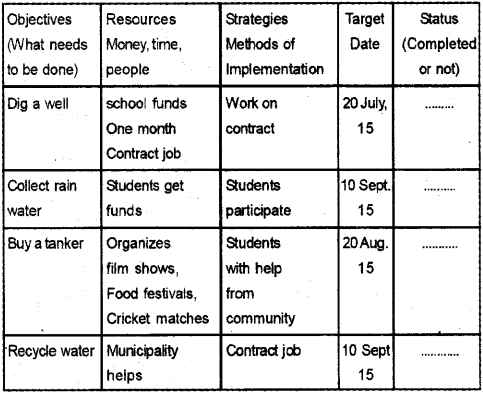
Possible challenges/difficulties:
I) The terrain is dry and so finding water in a well might be difficult. In that case a deep bore-well has to be planned. It might prove very expensive.
II) Participation by the Municipality might be minimal.
III) The community might not show sufficient interest in making contributions.
Activity VI: (Let’s Edit)
A website called studentjob is offering internship jobs for students.
Question 3.
Here is an application letter that a student has drafted to apply for the post of a marketing intern. Read it carefully and correct the mistakes in it Also rewrite the letter after corrections.
Answer:
Dear Sir,
I would like to apply for the position of a Marketing Intern, as advertised in studentjob.co.in. I am a II Year student, doing M.Com. at the University of Calicut. My specialization is in Marketing.
I have always had a keen interest in marketing and that influenced my decision to study Marketing at the university and take part in extra-curricular activities. I am an active member of the Marketing Society where I help arranging events, society meetings and talks from prospective employers. I was responsible for establishing an effective marketing campaign for the launch of a new bookstore in the campus, using various methods such as social media. I therefore have a strong understanding of how modern-day marketing techniques can be used for business opportunities and networking.
Furthermore, I have been elected as the Team Leader of ‘Student Enterprise’, where we are required to develop our own business idea and pitch it to potential investors against an opposing team. This allows me to develop my leadership skills by delegating the appropriate roles and responsibilities to each team member, ensuring the team will successfully reach its aims and objectives.
I have many skills which I am able to contribute to the job role. My excellent communication skills allow me to interact with members of an organization at all levels. I developed my public speaking and presentation skills by making university presentations to new and prospective students and to the members of my Faculty. I am organized, efficient and strive to take up any challenge given to me to the highest standard.
Attached is a copy of my CV. I can provide the names of referees who will support my application.
I look forward to hearing from you.
Yours faithfully,
Priya Sekhar
Read And Enjoy
Question 1.
‘We can complain because rose bushes have thorns or rejoice because thorn bushes have rose.’ – Abraham Lincoln.
Question 2.
Here perspectives make a difference. Read the experience the poetic rendition of Stammer by K. Satchidanandan.
Didi (Story) Edumate Questions and Answers
Question 1.
Read the following extract from the lesson ‘Didi’ and answer the questions that follow.
“On one blistering Mumbai day my taxi stopped at a traffic signal. Three children ran upto my window, smiling and begging and at that: moment, I had a flash of introspection”.
a) Who is the speaker?
b) The word introspection’ here means
c) How does the author look at the meaning of life?
Answer:
a) Shaheen Mistry
b) self-examination
c) She looks at the meaning of life with some concern. She is moving in a taxi and when it stops at a traffic signal three children come begging. They were smiling. The author must have wondered how these children could smile even in such precarious circumstances. They are zigzagging through the Mumbai traffic and any moment they can be hit by a moving vehicle. And look at the poverty of these children! They should be going to school and playing around with their mates at this age. But they are begging for their livelihood. This is the Mumbai of millionaires!
Question 2.
You happen to see the following advertisement and got interested and decided to apply for the same. Prepare an application and resume.
Vacancy Announcement
A reputed manpower company invites applications forthe following posts. .
No.1: Manager
Qualification: Should be a graduate in Commerce, experience in manpower field, good communication skill in English, age above 30 years.
Apply with Resume within 7 days: [email protected]
Only short listed candidates will be called for interview.
Answer:
[email protected]
Dear Sirs,
Sub: Application forthe post of Manager.
I saw your advertisement. I am interested in applying for the post as I thought my qualification and experience would suit your requirements.
I am enclosing my detailed resume for your perusal.
I will be available for an interview from now till the end of this month. You may decide the time and place. I will present all the original documents at the time of the interview.
Hoping to get the interview letter soon,
Yours faithfully,
Hamza Mohammed
Resume of Hamza Mohammed
Objective: To work in a company which can utilize my services and, at the same time, enable me to sharpen my capabilities forthe betterment of all.
| Name & Address: | Hamza Mohhammed XV/56 M.G. Road, Kochi |
| Mobile Phone : | 864702828888 |
| e-mail: | [email protected] |
| Age and date of birth: | 32 years, 11 January 1985 |
| Nationality: | Indian |
| Marital status: | Single |
| Educational Qualifications: | i) M.Com. with 76% marks, Calicut University, 2008 ii) B.Com. with 82% marks, Calicut University 2006 iii) +2 with all A’s from Don Bosco HSS Irinjalakuda. 2003 |
| Technical Qualifications: | Diploma in Computer Programming with specialization in Java, SQL and C++. |
| Experience: | I have been working as the Manager of GJ Info tech, Palarivattom Kochi, since July 2010. |
| Special Abilities: | Creating new computer programmes according to specifications. I have Leadership qualities. |
| Hobbies: | Travel and reading |
| Languages known: | Malayalam, English and Hindi |
| Referees: | 1. Prof. Naveen Vithayathil Khanna Nagar, Koratty, Chalakudy 2. Mr. Tom Nettikadan M.L.A., Chalakudy |
Question 3.
While appearing for the Plus one improvement examination 2016, you forgotto fill in certain entries in the main answer sheet. Hence your result is withheld by the Directorate of Higher Secondary Education. When you contacted the office concerned you were informed to send an e-mail citing your points. Now draft the e-mail.
Answer:
[email protected]
Sir,
I wrote the Plus One Improvement Examination 2016. But my result is withheld. When I contacted your office I was told thaf my exam number was not clearly visible in my History Paper and that is why the result was withheld. I am sorry forthe mistake. Here is my exam number: HSS 45678123. My Centre was Don Bosco HSS, irinjalakuda, Thrissur District.
Kindly take necessary action and publish my result.
Thank you,
Jones Mathew
Question4.
Given below are some findings of the research carried out by Delhi Diabetes Research Center on the changing food habits among children. Study them carefully and write an article for your school magazine.
(Hints: 85% school children-diabetic patients- Western eating styles-consumes fast food frequently- 62% eat junk food-green vegetables avoided-25% do not exercise-one in four children obese-prone to develop adult diseases-heart attack, diabetics-memory loss etc.)
Answer:
Changing Food Habits among Children The Delhi Diabetes Research Centre carried out a research for finding out the changing food habits among children. Its findings should cause us some concern in this regard.
The researchers found that 85% of the school going children have some form of diabetes. This is very alarming statistics. This has happened mainly because we have blindly copied the Western eating habits. The climate in the countries in the West is generally very cold. Their food habits suit that climate. But here in India we are in the tropics and the weather is not all that cold. Still we eat what the Westerners eat. Our children consume a lot of fast food – pizza, burghers, KFC (Kentucky Fried Chicken) and so on. It is surprising that 62% of the children eat junk food. Our children studiously avoid green vegetables from their diet. It is surprising that 25% o the children do not get any exercise.
They go to school in the school bus, come home, sit down to do their home work and then they spend their time before the TV or their computers playing various games. The result is terrible. One in four children is obese – overweight. The obese children are likely to develop adult diseases like heart attack, severe diabetics and memory loss. There have been instances of teenagers dying of heart attack. This is something unheard of in the past. Many children suffer from serious diabetics. Children fail in exams because they have lost their memory power because of the junk food they are consuming.
Parents, who are so much concerned about the welfare and future of their children, should stop giving them junk food. Children should be made aware of the risks involved in eating too much of fast foods. The food may be tasty but it can kill them fast!
Question 5.
With the idea of teaching the underprivileged children, Shaheen Mistry decided to start Akansha Centre and the Principal of Holy Name School at Coloba agreed to give a room in his school. Write the likely conversation between Shaheen Mistry and the Principal. (At least four exchanges.)
Answer:
Shaheen Mistry: Good morning, Sir! I am Shaheen Mistry, a social activist.
Principal : Good morning, Shaheen. I’ve heard aboufyou. What can I do for you?
SM : Sir, I think you can be of great help to me in solving a serious problem that we are facing. For educating the underprivileged children, we have started an organization called Akanksha. We want a room here for conducting our classes.
P : A room in this school? I don’t think it would be possible. We’re already running short of rooms and we find it hard to accommodate our own students.
SM : Sir, we need the room only after your regular class hours. We understand that you close the school at 4.00. So, maybe, from 4.30 you can lend us a room till 7.30 or so. Thus we get three hours to teach.
P : Shaheen, I am really sorry that I can’t do that. Soon after the class hours we get the rooms cleaned and keep them locked till the following morning.
SM : Sir, we assure you that the room you give us will be cleaned properly after our lessons are over. We are trying to uplift the underprivileged children.
P : I do want to help, but
SM : Sir, don’t say “but”.. Please give us a room. Your good gesture will help thousands of underprivileged children here. So, please be positive, Sir!
P : Okay, since you insist and since it is for a good cause, I will give you a room.
SM : Thank you, Sir! Thank you very much!
P : It’s okay.
Question 6.
The following is a conversation between the office assistant of a school and the book seller. Now complete the conversation choosing modal auxiliaries from the box given below, will, can, won’t, shall, needn’t, could
Bookseller : Excuse me sir. (a) ………… I meet the Principal right now?
Office Assistant: Sorry sir, he is attending a meeting.
Bookseller : Then if you don’t mind, you hand over this packet of books to the Principal, I shall be waiting outside.
Office Staff : Certainly sir, but you (b) ………… wait outside. He (c) ………… get enough time to see you and discuss the matter.
Book seller : OK sir, dont worry. I (d) ………… make a call and talk to the Principal.
Office Assistant: All right, bye.
Answer:
a) Can,
b) needn’t,
c) won’t,
d) shall
Didi (Story) About The Author
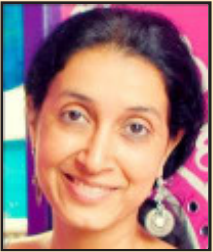
– Shaheen Mistri
Shaheen Mistri is an Indian social activist and educator. She is the founder of Akanksha Foundation. She is also the CEO of Teach For India since 2008.
She was born in Mumbai in a Parsi family. Her father is a banker with Citigroup. After attending boarding school in Connecticut, USA, she moved to India for higher education. She got B.A. in Sociology. Later she got a Masters in Education from the University of Manchester.
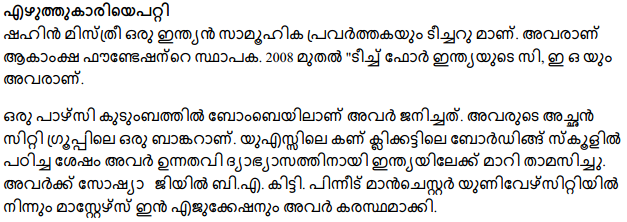
Didi (Story) Summary in English
“I reached to touch a rainbow today,
I reached up high so high.
And yet as high as I reached up,
I could not touch the sky.
I’ll reach to touch a rainbow again,
I’ll reach up higher than high,
And if I reach up high enough,
I just may skim the sky.”
Page 107: I remember sitting on the wide veranda of our Indonesian home, writing little poems and notes in a diary. I would sit and watch little ants carry large loads, determined to get to their destination. What was my destiny? I was 12. What had I achieved?
It was in 1983. We lived in Jakarta, in a lovely home on a quiet street. It was a pleasant life, until I was taken to visit an orphanage in the city. I don’t remember how the orphanage looked, but I vividly remember the children.
I saw different kinds of children-crying, laughing, quiet, screaming children. I did not know what to do. I returned to the orphanage every weekend. Perhaps it was curiosity or a sense of thankfulness for all that I had, or maybe a child’s desire to learn more about the world.
My father was a banker. He had to move from city to city.
I had to study in 10 schools in five countries and followed French, British, American and International school systems.
Page 107: I began to understand that life was not perfect during my summer vacations. My summers were spent between the orphanage in Jakarta and trips back to Mumbai. In Mumbai I volunteered at The Happy Home and School for the Blind. I remember thinking of the beauty you can create when you look beyond what you can see. The school had confident children running up and down the staircases or playing cricket on the terrace with a ball that jingled.
It was through these summer experiences in India that I began to see inequity. I’d go from a family lunch to the dining hall of the blind school. I would watch through the window of my air-conditioned car children begging in the streets. I saw piles of wasted food at a friend’s party. When I left I saw woman, sitting on the side of the road, giving out very small amount of dal and rice to her family members. I saw the slums of Mumbai. They appeared to be everywhere. I saw the disparity in the lives of people.
In 1989 I was on my vacation in India. On one hot Mumbai day, my taxi stopped at a traffic signal. Three children ran up to my window, smiling and begging. My mind started thinking. I suddenly knew that my life would have more meaning if I stayed in India.
In the days that followed I went on thinking about those kids. I realized the purpose of my life. I wanted to be part of making things better for children. I knew this could be my country. Whatever I did here could make more difference than my university life in America.
A week before I was to return to Boston, I telephoned my parents. I explained to them my desire to move back to Mumbai. They listened carefully. They advised me living in Mumbai would be greatly different from spending a vacation. But I persisted. They agreed on two conditions: I would get admission into a good undergraduate college in the city and later would go abroad for my graduate degree.
Page 109: My parents had studied at St. Xavier’s and so I wanted to study there. I wanted an appointment with the Principal. The office told me that admissions were closed three months earlier and the Principal does not give appointments. I was frustrated. A student had seen me talking with the Principal’s assistant. He told me that there was a side door to the Principal’s office and I could try it.
I went through the side door. The Principal, Fr. D’Cruz was surprised and before he could open his mouth I told him, “Father, my life is in your hands. I want to do something for the children of India. I don’t know-how, only that I must.” He asked me a few questions and I was admitted.
The academic system at St. Xavier’s was different from that of the US. Here bookish learning was stressed. I quickly realized that I would learn more in the city than in the classroom.
Now since I was in India, I wanted to understand it in a different and deeper way. I walked around the city. Once I walked into a sprawling, low-income community which was a maze of small alleyways, full of life. Some 10,000 people lived there without running water, no system of waste disposal, and shared six dark cubicle toilets in one alley.
Page 110:1 walked around that afternoon talking with children wondering how life would be different if each one of them had access to the opportunities to grow to their potential. As I was walking, a soft-spoken girl, in a sari, welcomed me into her home. Her name was Sandhya. She was 18, like me. She knew no English and I knew no Hindi. But she smiled, laughed and chatted a lot. I felt an immediate connection with her. Her life was so different from mine.
Every day I went to her house after college. Her home was smaller than the bathroom of our house. When children poked their heads inside the doorway to say ‘Hi’ to us, she would ask them to come in. These children formed the first class I would teach. Each day a few more children would come trying to learn a few words in English, ora little Maths ora song. I felt useful and confident.
This became my routine. I’d leave college and rush to my new world in the community. Here I saw truth and hope. The children shouted ‘Didi, Didi’when I went there. It was becoming a lifelong commitment.
‘Akanksha’ was bom of the simple idea that India had people who could teach. It had spaces that could be used as classrooms. It had funds to educate all the children. Everything was there. I simply had to bring them together.
The people in the community wanted only 3 things – housing, water and education. I knew that for the children to take education seriously, they have to be free from the community’s distractions. We started looking for our first Akanksha centre space.
I approached 20 schools in the city to give us one classroom in their building just for 3 hours every morning. All of them refused. Some thought the idea of teaching underprivileged children was too revolutionary. Some thought the children would spread diseases to other students. A principal of a reputed school even said that the glass bangles worn by the poor children would scratch the desks. Finally, when I was about to give up, the principal of Holy Name High School in Colaba, agreed to give me a room. That was the first Akanksha centre.
Page 111:1 mobilized volunteers from St. Xavier’s to teach. I made a rough plan of what they would teach. I wanted the classroom to be just a safe place for the children where they can forget, at least for some time, their roubles at home.
Akanksha came into existence in 1991. It started with 15 children. Now it has 3500 children, with 58 centre and 6 schools. The main things taught are English and Maths. Students are also trained in values, self-esteem and confidence.
(Excerpt from “Redrawing India” by Shaheen Mistri & Kovid Gupta)
Didi (Story) Summary in Malayalam
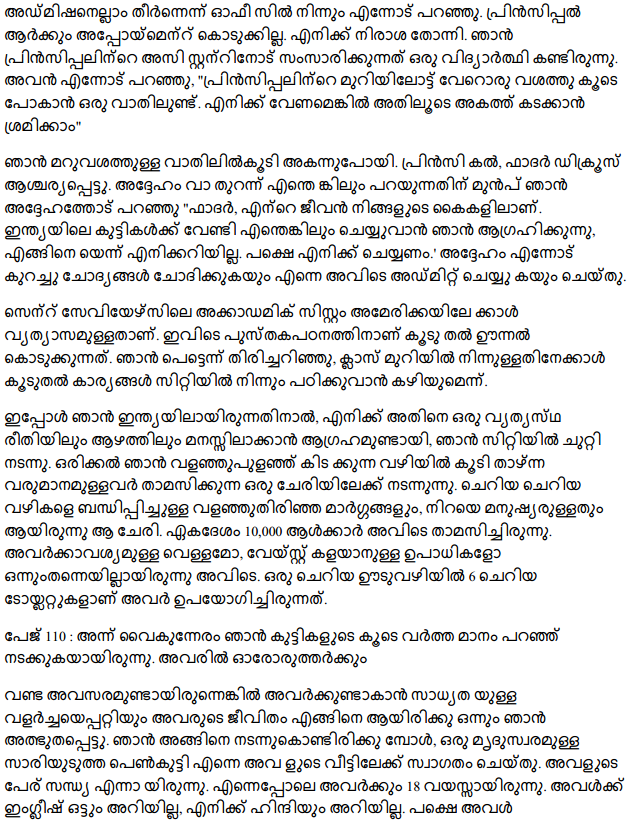
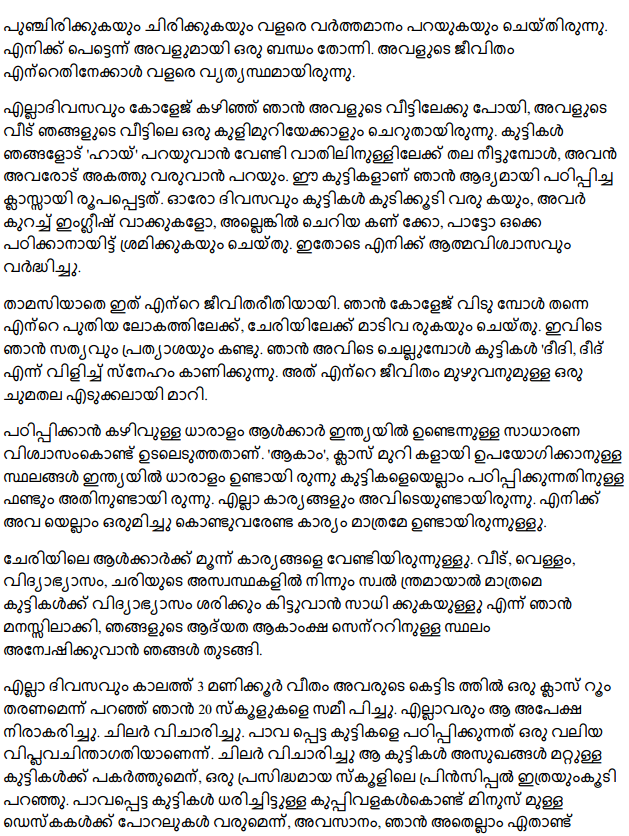
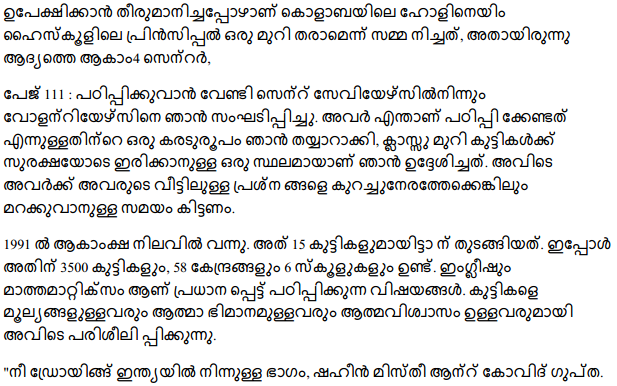
Didi (Story) Glossary

